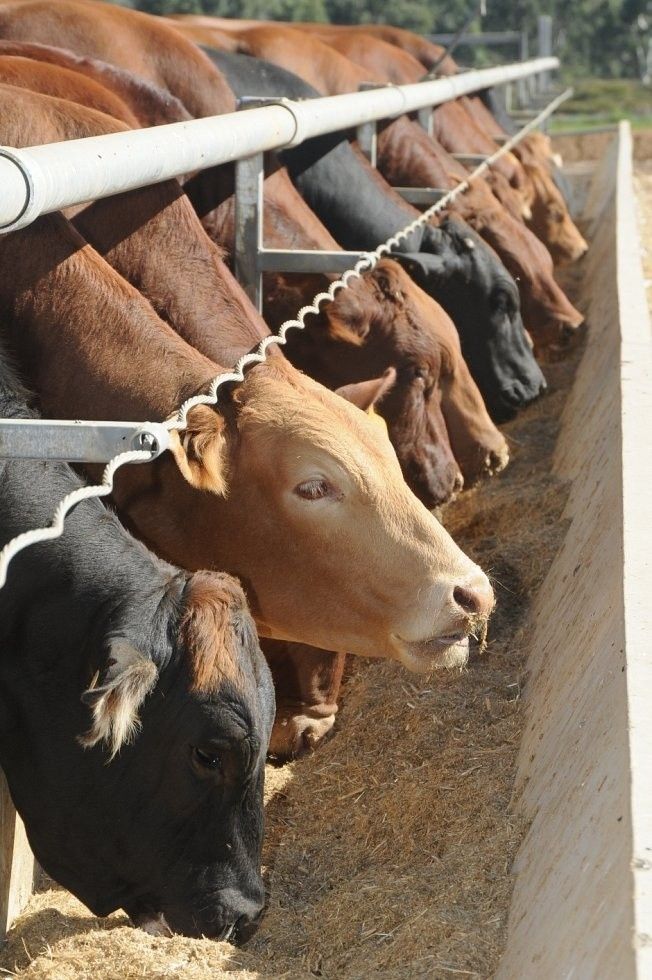Animal welfare is an important aspect of feedlot operations, as it ensures the wellbeing and humane treatment of animals throughout their time in the feedlot. Here are some key considerations and practices related to feedlot animal welfare:
- Housing and Space:
Adequate housing and space are crucial for the welfare of feedlot animals. Feedlots should provide clean and well-maintained pens or feed bunks that allow animals to move comfortably and access feed and water easily. Sufficient space allocation is necessary to prevent overcrowding and allow for natural behaviors and social interactions among the animals.

- Nutrition and Feed:
Providing a balanced and nutritious diet is essential for the health and welfare of feedlot animals. Feedlots must ensure that animals receive appropriate rations that meet their nutritional needs. Feeding schedules should be followed consistently, and the feed should be of high quality and free from contaminants.

- Health and Veterinary Care:
Feedlot animals should receive proper health management and veterinary care to detect and treat any health issues promptly. This includes regular health checks, vaccinations, parasite control, and appropriate treatment of illnesses or injuries. Feedlots should have protocols in place for handling sick or injured animals, including isolation and appropriate medical intervention.

- Animal Handling and Transportation:
Proper animal handling techniques are crucial to minimize stress and ensure the safety and welfare of animals during handling and transportation. Feedlot staff should be trained in low-stress animal handling methods and follow industry guidelines for humane animal handling. Transportation practices should also comply with regulations to prevent injuries and minimize stress during transit.

Most importantly, you should Note that our company can help you to start by giving you all the necessary information you need to get started if not yet in the business. Please check our online shop, we have all the standard business proposals for different capacities at very a cheap price made by the best agricultural specialists as well as Standard design plans that are made by the best agricultural architects around the globe. please visit our online shop now using the links below to witness by yourself
Design plans (FARM HOUSE DESIGNS – Kimd Construction & Farm Consultants)
Business plans (BUSINESS PLANS & PROPOSALS – Kimd Construction & Farm Consultants)
Welcome back from visiting our shop, hope you have placed your order for any of our products or you can place it after navigating more of our informative articles.
So let’s continue with our article!
- Environmental Conditions:
Feedlots should provide a comfortable and safe environment for animals. This includes proper ventilation and temperature control to prevent heat stress or extreme cold conditions. Adequate bedding or flooring should be provided to ensure animal comfort and minimize the risk of injuries.

- Behavioral Enrichment:
Enrichment activities can enhance the welfare of feedlot animals by providing mental stimulation and opportunities for natural behaviors. Feedlots can implement strategies such as providing access to clean water sources, appropriate resting areas, and objects for exploration and play. Environmental enrichment can help reduce boredom and improve the overall well-being of animals.

- Monitoring and Auditing:
Regular monitoring and auditing of animal welfare practices are essential to identify and address any issues promptly. Feedlot operators should conduct internal assessments and may also undergo third-party audits to ensure compliance with animal welfare standards and regulations. Continuous improvement and the implementation of best practices contribute to the overall welfare of animals in feedlots.

- Training and Education:
Proper training and education programs for feedlot staff are crucial to ensure that they have the necessary knowledge and skills to handle animals responsibly and comply with animal welfare standards. Ongoing education and awareness programs can help foster a culture of animal welfare within the feedlot industry.

It is important for feedlot operators to prioritize animal welfare and continuously strive to improve practices to ensure the well-being of animals in their care. Collaboration with industry organizations, veterinary professionals, and animal welfare experts can provide valuable guidance and support in promoting and maintaining high standards of animal welfare in feedlots.




